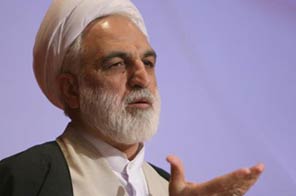Iran faces new political turmoil
TEHRAN: Iran was grappling with fresh political turmoil on Monday as President Mahmoud Ahmadinejad came under fire over the sacking of his intelligence minister, the latest crisis to rock the country since last month's election.
Ahmadinejad, who is due to be sworn in before parliament and to unveil his new cabinet next month, also saw his culture minister quit over what he said was a weakened government.
The nation has been in tumult since the bitterly disputed re-election of Ahmadinejad in the June 12 presidential poll triggered a wave of mass public protests and the worst unrest since the 1979 Islamic revolution.
The post-election chaos has also exposed deep divisions within the ruling elite in the Islamic republic and led to open criticism of not only Ahmadinejad but also supreme leader Ayatollah Ali Khamenei.
"A chaotic day for the government," thundered the front-page headline of the conservative Emrouz newspaper after the weekend cabinet drama.
The Mehr news agency quoted an "informed source" as saying Intelligence Minister Gholam Hossein Mohseni Ejeie was sacked following a "verbal quarrel" with Ahmadinejad at a cabinet meeting over his controversial pick for first vice president.
Esfandiar Rahim Mashaie finally stepped down as first vice president on Saturday after the all-powerful Khamenei intervened in the crisis and personally ordered Ahmadinejad to dismiss him.
Ejeie's dismissal has triggered a chorus of criticism even among the conservative wing in Iran, with MP Ali Motahari urging Ahmadinejad to "control his nerves."
"It looks as if he is intentionally bringing tension to the country. If the removal of the minister is because of this (objections to Rahim Mashaie's appointment) it is an ugly act because then it becomes a personal matter and has nothing to do with the country's interests."
The appointment of Mashaie, who last year provoked controversy by saying Iran was a "friend of the Israeli people," had angered hardliners even in Ahmadinejad's own camp.
"Dismissal -- the consequence of objecting to Ahmadinejad," was the headline in the hardline Khabar newspaper.
MP Mousalreza Servati said 200 MPs had written to Ahmadinejad asking him to "correct his behaviour so that he follows the leader's opinion seriously."
In another humilitating blow to Ahmadinejad even before his new government takes office, Culture Minister Mohammad-Hossein Saffar-Harandi quit.
"Unfortunately due to the recent events which shows the esteemed government's weakness, I will no longer consider myself the minister of culture and will not show up at the ministry as of tomorrow," Saffar-Harandi said in his resignation letter carried by the Fars news agency on Sunday.
The departure of the ministers has compounded Ahmadinejad's woes, with some suggestions he might need to seek a new vote of confidence in his present cabinet, even though his new line-up is likely to be announced in the next few weeks.
Iran's constitution stipulates that if half of the 21-member cabinet is changed during its four-year term, a new vote of confidence is required. Ahmadinejad has changed 10 ministers, including Ejeie, in his current mandate.
"This action was suicidal," lawmaker Heshmatollah Fellahatpishe said of Mohseni Ejeie's dismissal, while another MP Mousa Ghorbani branded the cabinet changes "illogical."
But MP Mohammad Reza Malikshahi said a new vote of confidence would be required only if Ahmadinejad accepts Saffar-Harandi's resignation.
Saffar-Harandi himself said in his resignation letter that Ahmadinejad had "verbally" dismissed him but was not issuing a written dismissal order for fear of a possible confidence motion.
In a new move to try to contain the crisis, powerful cleric and former president Akbar Hashemi Rafsanjani denied he was locked in a power struggle with Khamenei.
Rafsanjani, the head of Iran's main political arbitration body and the council which oversees the work of the supreme leader, has accused the regime of losing the trust of the people over the election.
He has called for the release of the many hundreds of people detained in the post-election unrest, which saw at least 20 people killed according to official media and scores more wounded.
But on Sunday he said: "The propaganda by the foreign media who try to suggest there is a power struggle at the top level of the regime is unfair injustice to the Islamic revolution."






